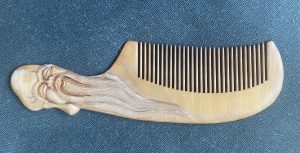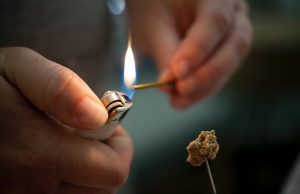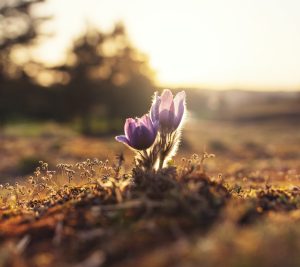Uncategorized
Hair Combing to Boost Energy

Beyond qi gong exercises, Chinese medicine recommends a number of simple and gentle, “health preservation exercises,” that if done consistently over time, can have a profound disease-preventive effect.
Some of the most common are self-massage, circles around our bellies to stimulate digestion, warming the lower back with our palms, or pressing circles with the pads of our fingers around the eyes to stimulate local blood circulation and avoid ophthalmological degeneration. Another one, which my baby finds most humorous to observe, is the “shaking of the bones,” where we stand with eyes closed and simply bounce up and down for 3-5 minutes to encourage circulation and induce a therapeutic vibration—only moderately compromised by a 9-month-old tugging on one pant leg.
My personal favorite is hair-combing. It is said from the end of winter until the beginning of summer our environment’s “yang” is rising. Outside of our bodies flowers and trees grow and bloom, and inside of us “qi” tends to elevate, both in the healthy form of boosts in mood and energy, but also potentially in the negative, manifesting as increased anxiety, anger, insomnia, hypertension and/or strokes: All forms of “pathological yang rising.”
Stimulating the scalp by using either our fingers or a fine comb is believed to engender a healthy yang rising, making it helpful for relieving fatigue, depression, or headaches. Superficially it is also great for stimulating hair follicles and combing out dandruff or dryness. Some orthodox practitioners believe we should comb or stroke only forwards in the morning and backwards in the evening (though I admittedly do only backwards in the morning because forward combing feels awkward and makes my “Jew-fro” look insane).
Conspicuous numbers for repetitions of any exercise in eastern traditions are 9, 36, and 100. What I personally find most pleasurable and manageable with hair combing is 9 strokes at each of the 4 longitudinal parts of the head (both sides, the vertex, and corners) for a total of 36/day. 100 is most advisable, but with the comb I find so many to eventually become painful.
The wood element in Chinese medicine belongs to the liver, which is largely in command of raising yang energy in the body. It is for this reason that if not the fingers we recommend using a wooden comb, as seen above, to match the elemental intention of the practice.
Although it seems rather odd in the west, where we tend more towards the “all or nothing” mentality of either high intensity training and marathon running or “couch-potato’ing,” these gentle practices of self-care can be the best prescription for long-term health preservation. Massaging our bellies and lower backs, shaking out the tension in our tendons and ligaments, and increasing local circulation all over our precious domes
As the weather warms and flowers bloom, I wish everyone a healthy yang rising for the months to come… and/or if you’re like me, and suspect you have “pathological yang” that could use some anchoring, please don’t hesitate to reach out for acupuncture or herbs.
From Deep Freeze to Heat Wave: How to Handle this Craaazy Weather

First I wish to apologize for the unusually extended duration between newsletters, as I am still naïve enough to be astounded by just how much time having an infant consumes. It reminds me of the power of adolescent peer pressure, which I heard about throughout middle school and my “tweens,” but always figured would not befall me so dramatically. In retrospect it’s amazing my parents survived my high school years. I like to think I am now paying a small piece of that karma back with our lovely, but rambunctious 9-month-old.
We took her to the Smorgasborg food festival (highly recommend) yesterday, conveniently located one block from our building, but shortly after we sat down, eager to enjoy our indulgent foods, realized she could not get comfortable in the dramatically sudden spike in temperature. Although she is an August baby, we kept her inside for most of the first month (Chinese medical tradition), so the only outdoor reality she is familiar with is one of frigid winds and bitter cold. Upon reflection of how my own body has felt in the past week, I recalled that we are almost as vulnerable to such weather changes as is my little munchkin.
Throughout winter the “yang qi” of the body builds perpetually, fortifying itself to warm and protect us against the cold weather, and cold pathogens. The constriction created in our blood vessels is partially a self-protective, innate wisdom; to keep our blood thicker and warmer in winter. While in the past we had a spring season by which to transition, both internally and externally, climate change has all but omitted this, especially in the northeast.
As a result of this climactic shock to the system, many of us—especially those with warmer physiological constitutions—feel bittersweet about the arrival of summer: Mentally relieved and excited for outdoor fun, though physically uncomfortable, just as my baby was yesterday while interrupting my food festivities.
At the risk of medical bias, the best thing I can recommend for immunological thermoregulation to sudden change is herbal medicine. Xiao Chai Hu Tang is a bupleurum, skullcap, and ginger-based formula that can be modified and specifically tailored to each individual’s body type for times like these, of course when there are not other resoundingly more pressing internal issues that demand herbal formulas of their own.
Other advice falls under the heading of David’s/Chinese medicine’s broken record, which is to continue eating warm foods. The tendency when we are overwhelmed by such heat is to reach for cold foods, cold drinks, and iced coffee instead of hot in the morning. The reason this is counterintuitive is because such substances and temperatures will further constrict our already narrowed, winter-made blood vessels that are struggling to adequately dilate to keep up with this unusual climate. Instead, it is a fine time to start going lighter on the heavier fats and animal proteins, and plain, steamed veggies are always a good idea (you can sprinkle salt, a great olive oil, and/or lemon on them on the plate to not taste so boring). Hot peppermint, chamomile, or chrysanthemum teas are the perfect nighttime elixir at this time, especially while in your air-conditioned homes. Moderate, sweat-inducing exercise is also a good idea to encourage vasodilation, purge some of the dampness we are absorbing by way of this humidity, and boost immune function by releasing microbial peptides in our sweat. The ideal time for exercise is between 10am-2pm (at the height of the day’s “yang qi”), but the “second most ideal time” is whenever you can. ‘Tis better to do imperfectly than to not do.
Why Are We Damp & How Can We Dry Out?

It’s rare to speak to a Chinese medicine practitioner for very long without hearing about “dampness” as a pathology within us. Most likely they are referring to a pathogen within you, but fear not—a similar diagnosis likely applies to them as well—as when it comes to dampness the question really is only how much there is and where it is concentrated.
Since the human body is made of approximately 60% water, proper fluid physiology is everything in our medicine. Any physician worth their weight should initially inquire not just about your digestion, but urination, sweat, and thirst as well (if they don’t, run). Our fluids must be properly moved and nourished, lest they coagulate and disease ensues. Anyone whose life is not stress free, plus without the perfect diet and exercise will suffer some degree of dampness. The good news is there are countless micro-decisions we can make throughout each day to mitigate or minimize its accumulation within us.
The first and most obvious is diet: Sugar, dairy, gluten, booze, and even a lot of foods that are generally considered healthy, are most implicated. For example, while salads, smoothies, fruit, hummus, and (non-dairy) yogurt all check off as nutritious within the context of a scientific lab, within the context of our microbiome they have a heavy, obstructive quality that requires more energy to digest. If you must have any of these it is advisable to chase it with hot, raw ginger tea.
Next is exercise: If we never sweat we will retain fluids, especially in the muscle layer, which might eventually manifest as a strong aversion to humidity or damp climates. While no one particularly enjoys the subway platform in August, for many it is at least tolerable, while for others it can potentially ruin their entire day. The latter folk generally cannot get enough air conditioning in summer, which further constricts blood vessels and closes pores, which traps even more fluids, and perpetuates the vicious cycle.
On the other hand, there is such a thing as too much exercise, sweating where we pass the point of purging unhealthy dampness and begin to lose healthy fluids which carry within them the same cellular energy required by our metabolism to avoid creating inflammation in the first place. As Jake LaMotta said: “Defeats its own purpose.”
Beware to wait to shower while we actively perspiring, as immersing open sweat pores in water makes us susceptible to dampness lodging in the muscle layer, which may later on manifest with symptoms that doctors tell us there is “no reason for.” If you must shower while still sweating, warm or hot water is preferable. Also, ideal to wait to shower at least 30 minutes after eating, as the last thing the microbiome needs is to be submerged in water while trying to break down food and keep itself relatively dry. I’d like to stop briefly bathing my infant immediately after dinner, but of course sometimes we have to sacrifice perfection for schedule sanity.
Managing Spring Allergies with Acupuncture

Albeit in its classic, bipolar, northeastern form, it seems even relatively less so this year that spring has sprung! We might collectively shout it from the proverbial rooftops, which for many of us may express in the form of a long-awaited vacation or just seeing loved ones for outdoor dining.
In Chinese Medicine spring corresponds with the wood element, the liver and gallbladder channels, and our emotions of anger, resentment, decision making, and initiative. The former two of which might seem ironic, as the warm-weather months tend to imbue our collective consciousness with a great sense of joy, especially in the northern regions where we’ve been all but hibernating for longer than most of us care to remember.
Recall that the “liver” is referring to our cortisol/stress hormone and how it impacts the body’s overall circulation. “Cortisol” has reached the point of sounding almost like a derogatory word in the medical community, as if necessarily a bad thing, but some degree of cortisol is actually quite healthy, quite functional, a delightfully motivating hormone without which we would fail to say, make important decisions or take any initiative.
Cortisol is a steroid hormone, a very “yang” hormone, and the nature of yang, as goes the nature of heat, is to RISE in the body. Simply look to nature to observe the most primary Chinese medical principle, which is that we are its microcosm. Just as the plants and flowers are sprouting, growing upwards, the energy within us moves accordingly. This is a good thing, but like any good thing potentially challenging for some, all to varying degrees.
For those of us with sedated, “yin-like” genetic constitutions, “liver yang energy rising” will pose very few side effects. These people need all forms of rising, as their Achilles heel is one of lethargy, feeling cold and/or depressed. For their opposites, those of us who tend more towards feeling over-heated, angry, or anxious, an increase in cortisol is a potential threat worthy of our disciplined consideration. Some of the ways to “soothe the liver” this Spring are:
- Sour foods, such as sauerkrauts, pickles, and lemon water, of course still alongside warm, cooked foods, so as to not harm the gut. You can also begin adding a sprinkle of lemon juice to your sauteed kale or collard greens, but be sure to dress with a good olive oil for best flavor.
- More exercise—still not to the degree we recommend in summer, but more than winter
- Hot peppermint or spearmint tea. Friendly reminder to NOT get your tea from local supermarkets if possible. To get the true medicinal benefits of tea (and food) it is important to buy top grade, such as from Arbor, Mariage, or Harney and Sons.
- Acupuncture is great for reducing the effects of cortisol and increasing circulation. The ancient texts instruct us to use more “luo (Lew-Oh) points” in the spring, which are be indicated for preventing latent pathogens from entering deeper into the body until the body’s qi is robust enough to expel it. This bears logic, as most of our bodies feels most robust in the summer season to follow. Additionally, I am that much more apt to employ liver and gallbladder points as indicated between now and June.
- Herbal medicine, such as bupleurum root, are excellent to manage stress and allergies this time of year, but as always only in the appropriate body types. This is not allopathic medicine with 1:1 symptom-prescription correlates. Bupleurum root has a raising and drying effect, which for many will feel like the greatest massage of their lives—for others like an uncontrolled panic attack. That, my friends, is medicine.
If you have any loved ones who might benefit from our FREE INITIAL CONSULTATION they can CLICK HERE or the link below.
Love,
David
How to (Emotionally) Survive Mercury Retrograde

About a week ago I started to notice my aging laptop struggling to start up, freezing, and requesting permission for the kinds of back-ups I didn’t understand. With any old computer we know these preliminary hiccups to be inevitable; nonetheless they always catch us off guard, interrupting the planned flow of life and work with an enormous inconvenience, ironically incited by this source of enormous convenience.
A few days later, while lying in bed I stretched my arms up, then dropped them down as I’ve done thousands of times before, this time accidentally knocking my favorite coffee mug off my nightstand, sent crashing onto the floor, in spite of having placed it in the most familiar location.
Why is this all happening? Then I remembered there was a Mercury retrograde upcoming in January. I dutifully googled the dates only to confirm that my absent-minded clumsiness and technological woes could once again be attributed to the planet Mercury moving in reverse, which is often the cause of miscommunications, travel delays, technological problems, odd accidents, and a whole host of pragmatic shit just not working out.
If you’re like me, a Gemini (or Virgo), Mercury is your “ruling planet,” so these few periods throughout each year can be especially challenging and disruptive. If you’re not like me and you deem all of astrology as kooky hogwash, I offer these questions for thought:
· If the sun and moon from so far away can have such a constant and obvious impact on us physically, is it so far-fetched to surmise the planets might impact our psyches?
· What would the ulterior motive be for contriving the paradigm of astrology? Skeptics can cite power as a motive for religion, and finances as a motive for medical charlatans or psychics, but what would be the motive for deceiving the planet that astrology is real? There is no money to be made, nor control to be had. To read more on this pontification, check out MY ARTICLE that was published years back in ELEPHANT JOURNAL.
I digress… Mercury Retrograde isn’t all bad. It is known to be a time when old friends (or lovers) happen to reach out or run into you on the street. Last week I spoke to an old friend for about an hour who I’ve probably only seen in person twice in the past two years, and when I think about it, I may have never actually spoken to him on the phone before, ever! As “Mercury…” is also not the best time for action, it is a good time for planning and organization.
Mercury returns direct on February 3, however it is still “wonky” for 1-2 weeks subsequent. For those who are so inclined I offer the following advice:
· Double check emails and texts before sending to make sure you’re saying what you want to say and that you’re sending to the right person!
· Back up, back up, back up all important files and technology.
· Don’t sign any important contracts or make life-defining agreements.
· Wait to have difficult interpersonal conversations if possible.
· Wait and take an extra breath before reacting in interpersonal exchanges if possible.
· Try to exercise more patience with your phone, internet & computer. Shit will happen.
· Look both ways when you cross the street! Seriously though… be careful. These are the kinds of times when people roll their ankle by stepping oddly off the curb, bump their head into the kitchen cabinet, or… knock their favorite mug off of the place it’s been situated in all their lives.
· Leave early—there will be delays!
Finally, take care. Personally, I’ve found Mercury Retrograde to be times where I’ve struggled more with anxiety or insomnia symptoms, both of which can lead to a whole host of other systemic imbalances. There is no direct connection between acupuncture and astrology—except maybe that both are heavily subscribed to by our kooky cross-section of the population—but obviously Chinese Medicine can offer wonders in restoration of psychological harmony. BOOK NOW 🙂


